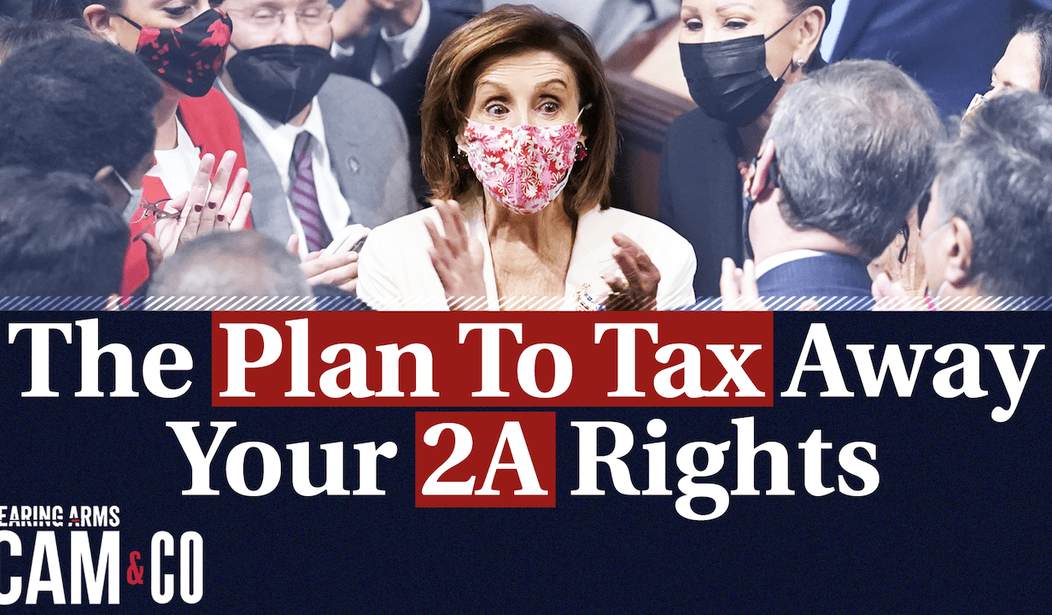With gun control legislation stalled in Congress, the Left is looking for new ways to target our Second Amendment rights, and Forbes contributer Roxanne Bland thinks she’s found the answer: use the tax code to curtail the exercise of our right to keep and bear arms.
Now, Bland isn’t exactly treading on unexplored ground here. There are already several localities that have imposed taxes on the purchase of firearms and ammunition, including the city of Seattle and Cook County, Illinois, but Bland is proposing something much bigger and broader than a local sales tax increase.
The Second Amendment does not bar states and localities from imposing taxes on firearms and ammunition, provided the tax is not so high as to put gun ownership out of the reach of the ordinary consumer, thereby burdening gun ownership and infringing on the rights contemplated by the Second Amendment.
Yet there is, or should be, more effort put into the goal of defraying the costs of gun violence. Taxing firearms at a flat rate may help states and localities cope with the astronomical healthcare expenses for gunshot victims, but it would probably not do much to reduce gun violence.
For that, what is needed is a change in the behavior of gun owners. Gun control regulation could influence behavior, but taking that route is akin to attempting to stay on the back of an angry bull. The easier and probably more effective way to change behavior is through a carefully crafted tax structure.
There is nothing novel in using the tax code to influence taxpayer behavior. For example, a state may encourage consumers in the market for a new car to purchase an electric instead of a gas model by giving shoppers a generous tax incentive for doing so.
Moreover, the revenue from taxing firearms has been used for close to a century to pay for conservation efforts, so why shouldn’t the revenue from such taxes be used to protect people? Considering the Second Amendment is no bar to taxing firearms, a properly structured tax would be a much more effective method for controlling the availability of select types of guns, including assault weapons, simply by raising the cost of ownership.
In other words, this route would silence gun control opponents who use the Second Amendment as a shield against reform. Using the tax code could shift the argument from one of a violation of rights to one that protects gun owners’ rights while lowering the negative costs gun ownership imposes on the rest of society.
The problem with Bland’s proposal should be evident just by reading the bolded text above. As the author notes, any tax that is designed as a burden on the exercise of a constitutional right is going to be legally suspect, yet that’s exactly what she proposes doing. In fact, Bland specifically states that the goal of her proposed gun tax is to change the behavior of American citizens by raising the cost of gun ownership.
Far from protecting gun owners’ rights, as Bland claims her proposal would do, her 2A Tax would inhibit gun ownership itself, and would have a regressive impact on working class and lower-income Americans.
The instances of a single individual accumulating many weapons could be reduced by making the first purchase of a gun tax free and then imposing an incremental tax on subsequent purchases.
However, the increase would have to be substantial, perhaps in increments of 10 percent per weapon. Under such an approach, by the time a buyer reaches a certain number of purchases, the amount of tax could potentially reach at least one-half of the firearm’s value.
This is a screwy idea on multiple levels. Not only is Bland endorsing the idea of tying the exercise of a constitutional right to the size of your bank account, but in order to implement her proposal she wants to create a national gun registration scheme.
Levying incremental taxes does not prohibit anyone from building an arsenal, but it certainly makes it more expensive to do so. To carry this out, all gun sellers, including those at gun shows, would be required to issue and record an official certificate of title for each purchase, thereby making it easier to track the number of weapons a person owns.
Democrats can’t pass universal background checks through Congress at the moment, so what makes Bland believe that establishing a national gun registry and imposing sweeping new taxes on the exercise of an individual right would be any more popular? My guess is that the vast majority of Democrats running for re-election next year want nothing to do with an idea like this, unless they’re representing a D+30 district.
Bland’s idea is predicated on a simple (and false) premise: it’s wrong to exercise your Second Amendment rights.
Thus far, the debate over gun control has centered on regulatory measures, which has vehement opposition. Yet it is possible that gun control — that is, influencing gun owners’ behavior — can be achieved through the tax code, a means that has rarely been discussed. Considering that gun ownership in America has risen sharply in the past few years, perhaps it is time to change tactics and give the tax code a try.
I think it’s a good thing that more Americans are embracing their Second Amendment rights, and it’s great that we’ve been able to remove some of the barriers to keeping and bearing arms in recent years. Bland and her fellow gun control supporters obviously take a much dimmer view of our civil liberties, and if she thinks there’s been “vehement opposition” to attempts to ban our guns and remove our right to carry, I can promise her that the objections to her proposed 2A Tax will be just as loud… if she ever finds a Democrat dumb enough to turn her big idea into a bad bill, that is.








Join the conversation as a VIP Member